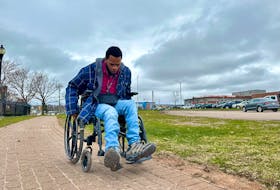Grieving a tragedy like a mass shooting is difficult. In the midst of a global pandemic, when normal grieving rituals have been disrupted, it can be extremely difficult.
However, in the wake of this week’s horrific mass shooting that took the lives of many Nova Scotians, it is important to recognize that grief is a natural process and to not put barriers in its way, according to a longtime clinical psychologist.
“We have an innate, evolved ability to overcome grief,” says Dr. Simon Sherry, a professor in the Department of Psychology and Neuroscience at Dalhousie University.

“Don’t postpone your grief reaction due to COVID-19. Let nature take its course.”
The first thing that people should do in order to grieve and come to terms with the tragedy is to “turn to each other,” Sherry suggests.
“Bereavement is painful and it is difficult, but the vast majority of people will, with the help of others, overcome this grief even in an extreme situation,” he said.
Another way to overcome grief within the limitations of the COVID-19 pandemic, he said, is to come together with others in some form of solidarity. This can include making monetary or blood donations, or perhaps offering up a skill set such as that of a counsellor to donate time to help those who are vulnerable in the aftermath of the tragedy.
Creating and sticking to a routine, with scheduled activities like walks or socializing with loved ones online, can also help Nova Scotians in the aftermath of the tragedy and during the pandemic, providing them with a sense of security and stability, Sherry added.
“Right now, the world seems a scary and unpredictable place in light of the pandemic and now the mass shooting. Return to structure, return to routine. There’s safety to be found within it,” he said.
Sherry noted that grief has "no particular timeline" and that everyone should grieve at their own pace.
For most, he said he expects the grief from the tragedy to reside within a matter of weeks to months. For others, who may experience shortterm or long-term distress, he said it’s best to reach out to a social worker, a physician or a psychologist.
Noushin Ziafati is a local journalism initiative reporter, a position funded by the federal government.








